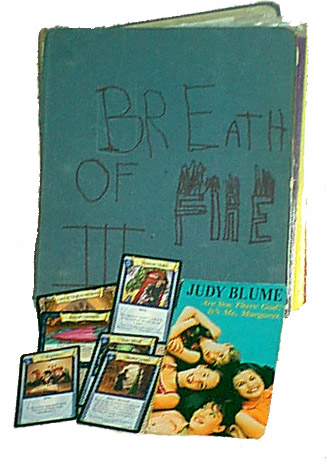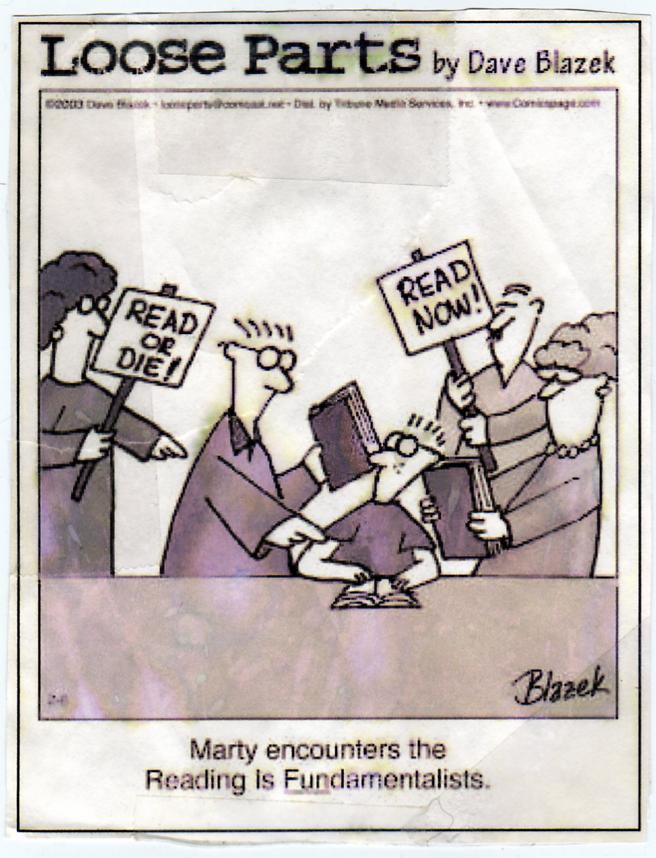Sandra Dodd, three children, two reading and one mostly reading (August 2002?)
Just because a child knows there is a code and a pattern doesn't mean he knows how to read. There's quite a bit of practice required for reading to really work fluently.
 Holly was at a Harry Potter card tournament today. She had an irritating opponent and came home and cried. Two of the things he did: Read his cards aloud to himself, holding them under the edge of the table, and wouldn't read them aloud for her to hear (but couldn't read silently), and when she would ask to see what his card could do, he would hold it up but not let her touch it.
Holly was at a Harry Potter card tournament today. She had an irritating opponent and came home and cried. Two of the things he did: Read his cards aloud to himself, holding them under the edge of the table, and wouldn't read them aloud for her to hear (but couldn't read silently), and when she would ask to see what his card could do, he would hold it up but not let her touch it.
Those are reading related things BIGTIME. She was pretty frustrated, but she did have the option not to participate.
Marty's learning to read was very phonetic. Kirby's wasn't. Holly's is a combination. There's more than one way to learn to read because people learn to read in more than one way, and in various combinations, and different people's minds are organized different ways.
When I was in first grade we were doing "look say." We learned some phonics rules, but not tons. We outlined letters for our reading practice, so we would see the shapes of common words.
I changed schools, districts, STATES for second grade and they taught all phonics. I thought phonics was fun, but I already knew how to read at that point, so it was just busy work and amusement, and something to argue about (whether that drawing was a cup or a mug, etc.).
Once a child is reading, it doesn't matter how he learned it.
—Sandra
[Clarification two days later:]
-=-Once a child is reading, it doesn't matter how he learned it. -=-
When I wrote that it was within the context of discussing unschooling.
I don't believe it out of context at all. Within the range of a child
learning through is own inquiries and experiments, I don't think whether his
own mental organization followed more a phonics-and-rules pattern or a whole
language and favorite words pattern, or any combination of tricks and tools.
I don't think traditional reading instruction is as good for the eventual
happiness of that reader as a flexible path to reading is.
Sandra
HOW UNSCHOOLING AND READING CAME TO THE DODD KIDS
The following was written in November 2002, when my children were 16, 13 and 11.
I eased into unschooling. Kirby didn't go to kindergarten. I registered to homeschool, figuring that if he did well I had the option to put him in first grade the next year. If he "didn't do well," he could go to kindergarten the year after, or we could keep homeschooling. I knew four homeschooling families from the babysitting co-op I was in. Most of the other moms were La Leche League Leaders. I wasn't a leader, but that was my "gang of moms."
Two of the families were structured homeschoolers who (not coincidentally, I think) hit their kids, shamed them, and weren't too close and intimate with their kids intellectually. They had been gentle with the infants, and nursed on demand, but it didn't translate to the way they treated eight- and ten-year-olds.
Two families were unschooling. One family went from three to four children during that time (I still know them, and two of those now-teens were over here last night). The other family went from four to five children in those babysitting co-op years, and they're up to nine and are probably not actively involved in homeschooling. Her husband is a minister and some of the kids are going to a small school the church runs.
Surrounded by good and bad examples, and having seen how Kirby was in two classes he took (dance and art), I thought he and school would not yet be a match. Within a month I was hooked and that was that for Kirby, But I thought Marty was so much different from Kirby he might want to go to school. He didn't.
And then I thought "Maybe Holly will want to go to school just to be away from the boys, and independent." She didn't. But yet she does, in a way. She likes to take classes and get herself into structured situations. I support her but I don't play enforcer for her.
So, none of them has ever been to school. Marty hasn't even visited. Holly has visited three occasions (four if you count going to college classes one day with a friend, from which the then-seven-year-old Holly learned about and later discussed "inertia"). Kirby has been to a couple of school assembly functions, but not to a classroom.
Kirby was big into pointing at letters and naming them even before he could tell someone how old he was. It didn't lead to early reading. He read when he was eight, fluently at ten, I guess. Marty read at nine, fluently at ten or eleven.

This was on our bathroom wall for years.
Holly wasn't reading at ten. She wasn't happy about it, either. She is at the point now where she is reading words without meaning to. For fun she tries to walk around the house without recognizing any words. At eleven, she's still not reading chapter books. But if you met her and talked to her you wouldn't think for a second, "I bet this kid doesn't even read," because there's not much she can't talk about, and if she knows nothing about it but it sounds interesting, she'll ask intelligent questions.
I like the amazement that it works. I still have it too, when one of my kids says or does something that is news to me, and I wonder where they got it.
by Sandra Dodd
2002
Kirby took about seven years to learn to read, if we count from the time he
could identify letters to the time I could leave him a note saying "I went to
the store and will be back at 10:00."
It was a step on a journey.
I didn't make a big deal about kids taking steps either. They walked to
walk. They walked to get somewhere. It was inevitable.
Sandra
What was referred to as
"Unschooling-dotcom" was the e-mail list of unschooling.com (no longer an active forum). The list survived for a while at here, as a google group which might still have available archives..
Three Readers, an article published in Live Free Learn Free in 2005, about my kids' reading.
Other reading stories are here.

 Holly was at a Harry Potter card tournament today. She had an irritating opponent and came home and cried. Two of the things he did: Read his cards aloud to himself, holding them under the edge of the table, and wouldn't read them aloud for her to hear (but couldn't read silently), and when she would ask to see what his card could do, he would hold it up but not let her touch it.
Holly was at a Harry Potter card tournament today. She had an irritating opponent and came home and cried. Two of the things he did: Read his cards aloud to himself, holding them under the edge of the table, and wouldn't read them aloud for her to hear (but couldn't read silently), and when she would ask to see what his card could do, he would hold it up but not let her touch it.